-
No-Code
Platform
-
Studio
No-code agentic platform delivering the fastest time-to-value and the highest ROI
-
Studio
-
AI-Native CRM
CRM
-
AI-Native CRM
New era CRM to manage customer & operational workflows
CRM Products -
AI-Native CRM
- Industries
- Customers
- Partners
- About
Finance CRM - A Full Guide on CRM for Financial Services
Updated on
November 20, 2025
15 min read

In the fast-changing world of finance, it’s no secret that building successful, long-lasting relationships with customers is key to ongoing success. Just like in any other industry, great client relationships are crucial, and that’s where Customer Relationship Management (CRM) comes into play.
As financial institutions adapt to changing client preferences, navigate tricky regulations, and face fierce competition, CRM has become an essential part of their toolkit. But what exactly is CRM in the finance world? It's a comprehensive approach that combines a strategic commitment to building solid client relationships with specialised software to get the job done.
In this article, we will dive deeper into how CRM software functions in the financial industry, exploring how it impacts client interaction and the delivery of financial services.
What is a Finance CRM?
Finance CRM is a specialised software designed for the unique needs of the financial industry. Its main goal is to help financial advisors build, maintain, and strengthen relationships with their customers.
This versatile tool includes a range of functions, like contact management, sales and marketing automation, customer support and service, and analytics and reporting to name a few. With these features, financial advisors can offer personalised financial solutions, anticipate clients' needs, and consistently deliver top-notch services.
In addition, financial CRM software goes beyond just relationship management. It also plays a pivotal role in compliance management by securely storing and organising sensitive client information, ensuring that financial business meets complex regulatory standards.
But it doesn’t stop at just relationship management. Financial CRM software also plays a crucial role in compliance management by securely storing and organising sensitive client info, making sure the business meets all the regulatory standards.
Why Do I Need a Financial Software?
In a time of fierce competition, changing client needs, and quick digitalisation, CRM is a must-have in the financial services industry. The numbers don’t lie: in 2021, sales o bank CRM software hit $9.5 billion, and projections show it growth to $39.2 billion by 2031, with an annual growth rate of 15.7%.
Financial advisors count on CRM systems for a variety of good reasons, all contributing to their success and profitability:
- Personalised customer interactions. Financial CRM software makes sure that customer interactions are not just routine but also personalised, showing customers that they are truly valued. This leads to greater satisfaction and long-lasting loyalty – which is crucial in an industry where trust and reliability are everything.
- Automated administrative tasks. CRM for financial services is brilliant for freeing up financial pros from the grind of admin tasks. By automating stuff like document generation and appointment scheduling, these CRM systems let financial advisors put their energy into higher-value activities, like engaging with clients.
- Seamless collaboration and communication. Financial CRM systems make teamwork easy, both within the organisation and with customers, across various channels. Keeping communication consistent and timely is key to building strong relationships and trust.
- Champion of compliance. When it comes to strict regulatory requirements, financial services CRM is a real champion. These systems securely store and manage sensitive financial info, making sure that the business stays in line with data protection and reporting regulations, and dodging potential legal and reputational risks.
Which Departments Can Use CRM For the Financial Services Industry For Their Advantage?
CRM solutions for financial services are versatile tools that can be used across multiple departments within a financial business. These systems can fit the unique needs of different organisations, whether they are banks, credit unions, insurance companies, or investment businesses, making everyday tasks easier and boosting overall departmental effectiveness.
Let’s take a look at some typical departments found in almost any financial business and see how a modern CRM can ease their daily tasks:
Marketing
The top-notch CRM for financial services gives marketing teams the power to reel in leads like a pro and boost brand visibility. It makes it easier to create, run, and tweak marketing campaigns that hit all the right spots across different markets and areas.
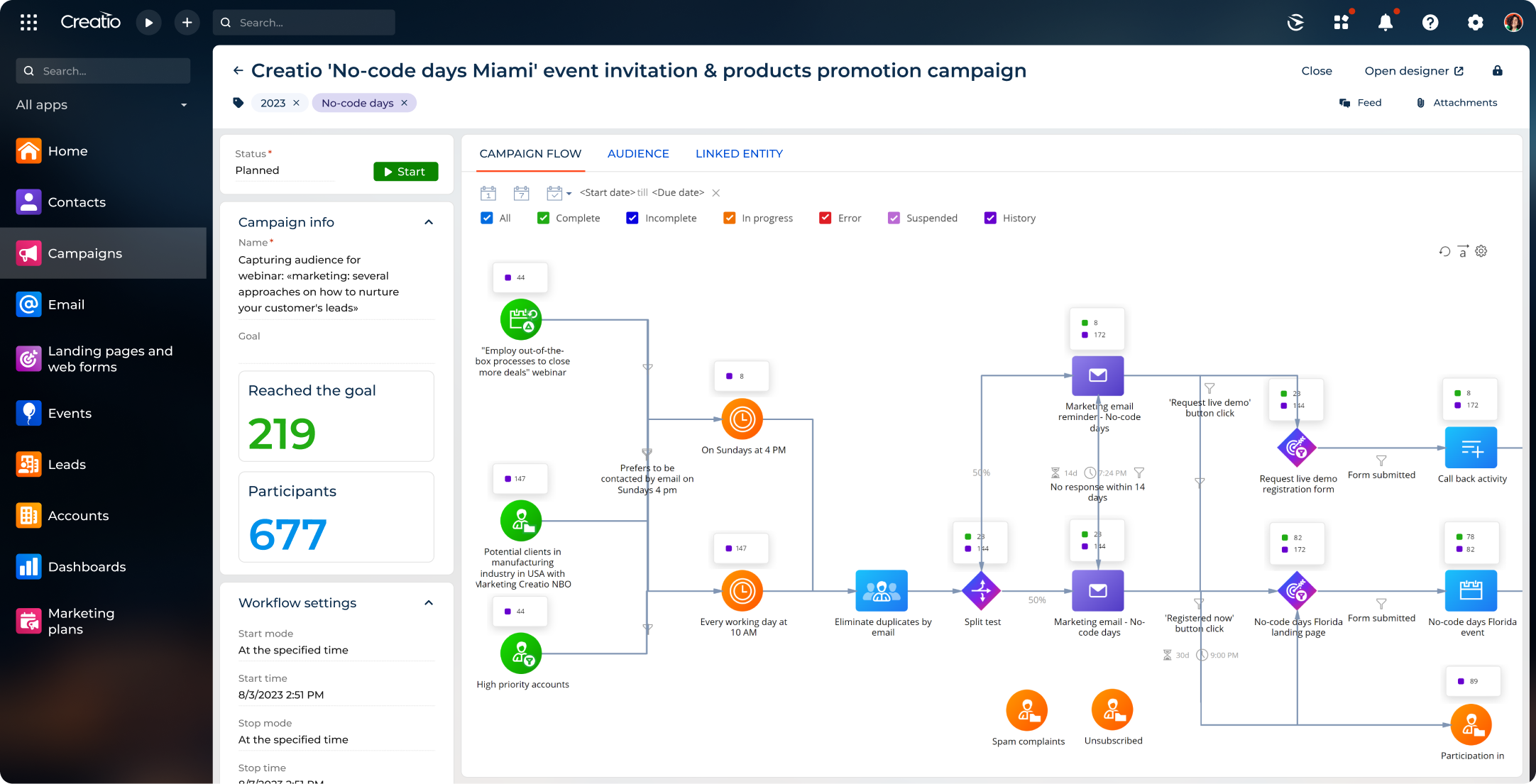
With its marketing automation features, CRM for financial services helps businesses work smarter, not harder, in their marketing game. Think lead nurturing campaigns, email marketing, and more. By tapping into automation, marketing teams can deliver timely and targeted communications to prospects and clients, building relationships and nudging them along the sales journey.
On top of that, CRM for finance provides valuable insights and analytics that help marketers see the real impact of their campaigns and fine-tune their strategies for maximum ROI. By keeping track of key metrics like campaign performance, lead conversion rates, and engagement levels, marketers can spot trends, tweak targeting tactics, and allocate resources where they will make the most impact to drive business growth.
Sales
Finance CRM is a game-changer for sales activities, bringing everything into one place. It makes managing client interactions, leads, and opportunities running smoothly. The sales team gets real-time access to all customer info they need, from financial profiles to investment preferences, and past communications.
This easy access means sales reps can have more personalised conversations with prospects and clients. They can tailor their pitches and recommendations to match each person’s unique needs and preferences.
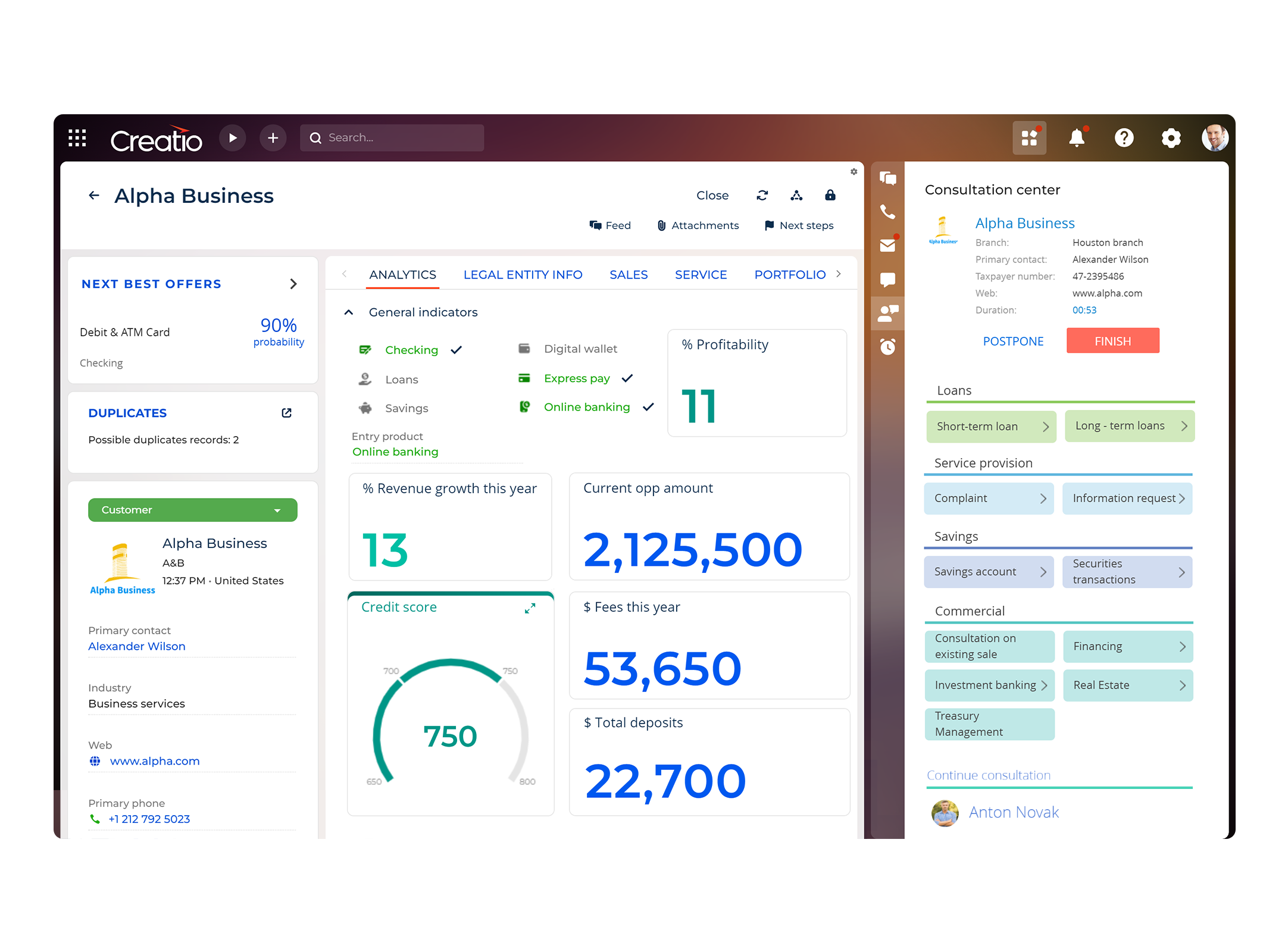
On top of that, CRM helps ease admin tasks that come with sales processes, like managing leads, tracking the pipeline, and following up with clients. By automating repetitive tasks and workflows, the CRM frees up valuable time for the sales team to focus on what really matters - building strong relationships and closing deals.
Customer service
CRM for financial services gives customer support reps a complete complete view of customer's info, so they can quickly handle inquiries and sort out issues. This leads to client satisfaction, faster response times, and better service overall.
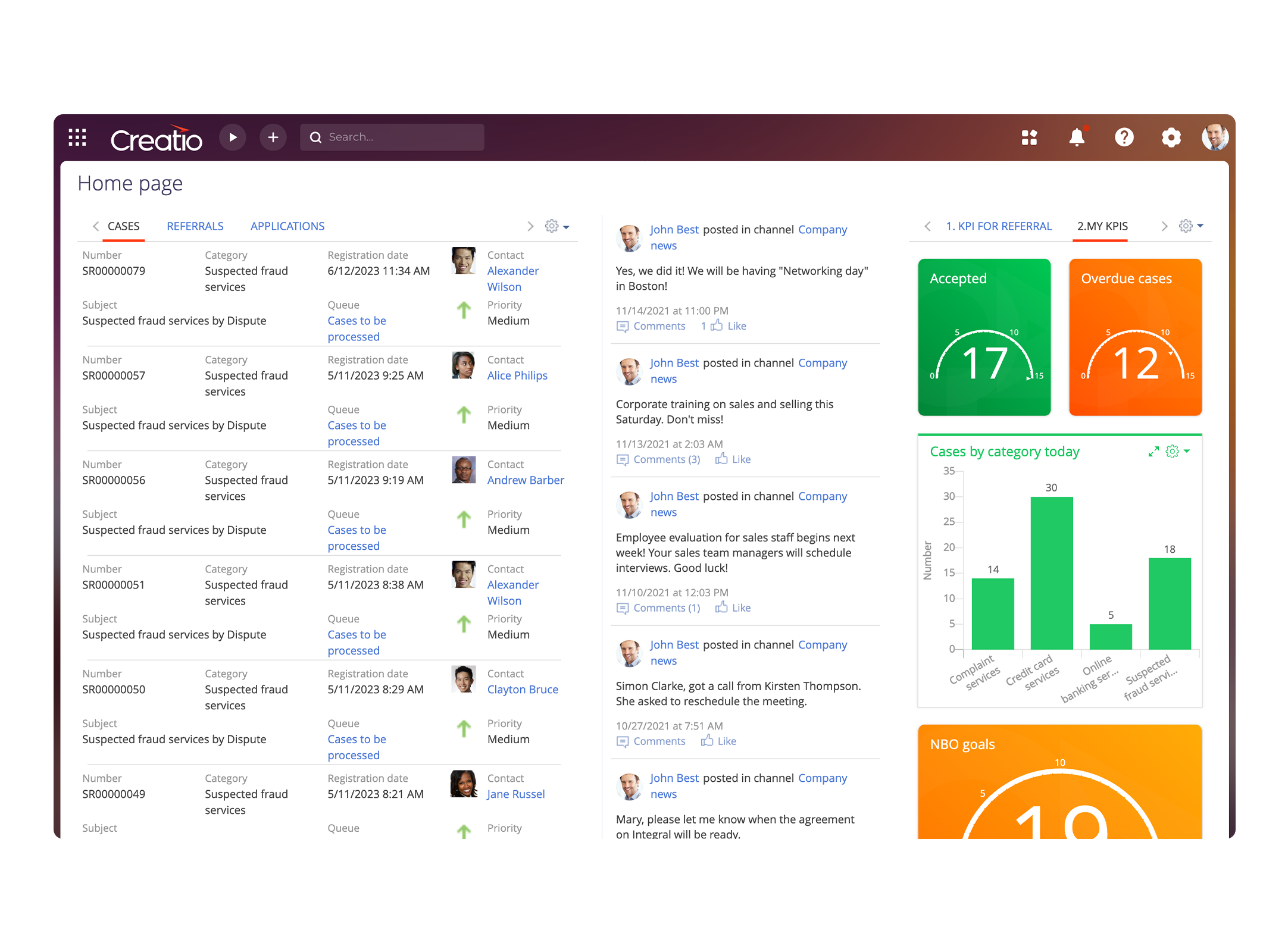
One of the key benefits of CRM is how it eases communication and teamwork across departments. Consumer support reps can easily work with sales, marketing, and operations to tackle complex problems and offer well-rounded support. This means that clients get consistent and coordinated help at every stage, boosting their satisfaction and loyalty.
Front-office
Financial CRM systems are boon for various front-office roles, like relationship managers, financial advisors, and portfolio managers, helping them deliver personalised financial advice. These systems offer insights into client financial history and goals, making it easier to offer informed recommendations and engage with customers.
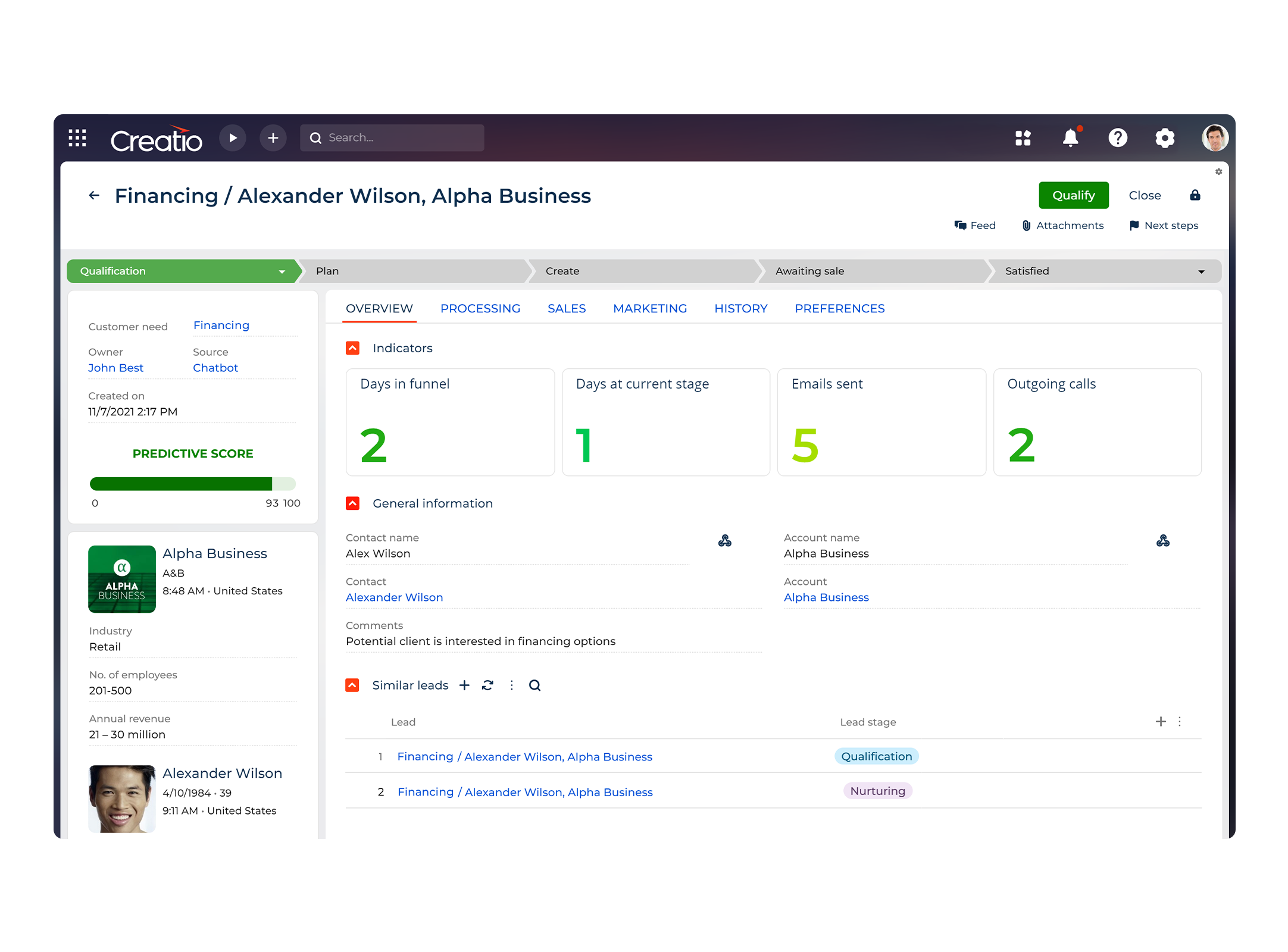
For relationship managers, CRM offers a complete view of customer relationships, allowing them to build deeper connections and tailor their approaches to meet each client’s unique needs. Financial advisors use CRM systems to conduct comprehensive financial analyses, assess client risk profiles, and recommend suitable investment strategies.
Portfolio managers also win with this software, as it helps them to keep an eye on portfolio performance, analyse market trends, and make well-informed investment decisions.
Loan origination and underwriting
In lending departments, finance CRM makes the loan origination process, easier by streamlining application tracking, automating workflows, and improving underwriting decisions. Financial advisor institutions can centralise applicant information, documents, and communications on one secure platform, making the loan application process smoother. This ensures that loan officers and underwriters have easy access to all necessary info throughout the entire lifecycle.
Plus, CRM automates routine tasks like data entry, document verification, and application status updates. By cutting down on manual processes and reducing administrative burdens, CRM speeds up the loan origination process, slashes turnaround times and boosting operational efficiency.
CRM also supports informed underwriting decisions by providing detailed borrower profiles, credit histories, and financial data. This allows underwriters to perform thorough risk assessments and make savvy decisions.
Compliance and risk management
CRM systems offer secure data storage and help manage sensitive financial and personal client information. This helps financial advisors avoid legal and reputational issues, ensuring compliance with regulatory standards and strong risk management.
A CRM system in a financial advisor business isn't just for the client-facing teams. It also benefits administrative departments like accounting, legal, HR, and more. By making easier data sharing and processes, it improves productivity and collaboration across the whole organisation.
Benefits of Finance CRM
Finance CRM offers heaps of benefits to financial advisors, improving their operations and customer interactions. Here are the main perks of CRM for financial services:
Enhancing relationships with clients
Positive client relationships are crucial in the finance industry, and a finance CRM plays the main role in nurturing these connections. With centralised client interactions management, every touchpoint, from the first contact to ongoing communication, is seamlessly tracked and managed in one place.
This means financial advisors can see the whole picture of each client's journey, including past interactions, preferences, and financial goals.
Boosting client retention
Financial CRM systems help keep customers on board by personalised communication and timely follow-ups, making sure they feel valued and supported. Plus, they offer insights into client behaviours and preferences, letting financial advisors proactively address their needs and concerns.
Increasing sales and revenue
Financial CRM systems offer the sales team a centralised platform to manage client interactions, leads, and opportunities. This leads to more personalised engagement, less paperwork, and better conversion rates by making sales processes run smoother, boosting revenue for financial institutions. Additionally, CRM data-driven insights help spot effective cross-selling and up-selling opportunities, increasing revenue from existing customers.
Enhancing operational efficiency
CRM for financial services boosts front-office processes by streamlining client interactions and allowing for more personalised help. In the middle office, it helps with the risk management and compliance tracking, ensuring spot-on and timely decision-making. For the back office, CRM systems optimise and manage admin tasks, cutting down on manual work and improving customer data management, boosting the overall efficiency of the financial institution.
Improving employee productivity and collaboration
Finance CRM ramps up employee productivity by automating routine tasks like data entry, lead allocation, document generation, and more. This cuts down on manual work, reduces errors, and frees up the team to focus on higher-value activities, making work processes more efficient and productive. It also encourages teamwork by making it easier to share data and communicate, leading to better customer support and smoother internal processes.
Key Features of Financial CRM Software
Сhoosing the best CRM for your financial institution in today’s diverse market can be a bit challenging. Each CRM solution comes with its own set of features, strengths and weaknesses. However, no matter wich CRM you opt for, there are several key that are essential for adding value to your financial business operations:
- Unified data management means bringing together and organising client data, including financial history, preferences, interactions, and important documents. This complete view of customer info helps you understand each client’s needs, leading to more personalised experience.
- Marketing and sales automation improves everything from marketing campaigns, to lead generation and managing sales opportunities. These tools make sure prospects turn into loyal customers, boosting revenue and the return on marketing investments.
- Client service and support is crucial for managing cases, handling support ticketing, and resolving queries efficiently to make sure customers receive timely and effective support.
- Workflow automation simplifies various processes across front-office, middle-office, and back-office like customer onboarding, loan management, verification and underwriting. By automating these workflows, the CRM system speeds up decision-making, reduces manual effort, and improves operational efficiency overall.
- AI and machine learning tools help financial pros analyse data, spot trends, and make predictions. This allows them to make savvy decisions and offer more personalised financial solutions to customers.
- Integrated omnichannel communications make sure that customers can interact with your organisation through their preferred channels, making interactions convenient to them.
- Document management centralises document storage and retrieval, making it easy to access client records, financial forms, and other important docs.
- Analytics and reporting tools give insights into customer behaviour, performance metrics, and how well your marketing and sales strategies are working. This helps financial advisors make decisions based on facts, adjust their strategies, and keep improving their services.
Choosing the Right Finance CRM: Factors to Evaluate
Choosing the right financial software is a big decision for financial advisors. To make the best choice, consider these key factors:
Identify your requirements
Before picking a CRM for financial advisors, it's important to nail down your organisation's unique needs and goals. Take a good look at your current workflows, pain points, and future plans to figure out features and functionalities that matter most for your business.
Think about things like the size of your client base, the complexity of your financial products or services, and regulatory compliance needs. Get key stakeholders from different departments involved to gather info and make sure everyone’s on the same page with the organisation’s goals. By clearly defining your requirements upfront, you can narrow down your options and focus on choosing a CRM that is the best fit for your unique needs.
Scope of features
When checking out CRM options for the finance industry, it's important to consider a full set of features that suit your specific needs. Look for CRMs that offer features mentioned earlier, plus strong contact management, analytics, marketing automation capabilities, and more.
Customisability
Customisation is a key to making the CRM fit your unique processes. Look for a system with no-code tools, tools, so you tweak the CRM to match your workflows without needing deep coding skills or IT resources.
User adoption
The CRM for financial services should come with top-notch training materials and lessons to help staff get on board. Plus, having 24/7 customer support is a must to ensure you get help whenever you need, especially in urgent situations.
Ease of use
A modern, user-friendly user interface (UI) is key for staff efficiency. The CRM should have an intuitive design that makes it easy for employees to navigate and quickly access the tools they need, cutting down the learning curve and boosting productivity.
Seamless integration
Integration capabilities are a must for a financial CRM, ensuring smooth connectivity with other essential tools and systems in your business. Look for CRMs that easily integrate with accounting software, financial planning tools, and document management systems to streamline data exchange and cut down on manual processes.
For wealth management firms,investment advisors, and financial organisations, integration with accounting software and portfolio management tools is essential. This allows seamless client portfolio tracking and the generation of financial reports. Plus, integration with third-party financial data providers levels up decision-making by giving real-time insights for investment analysis and risk management.
Security
Financial data is highly sensitive, so having top-notch security and data governance measures is a must. The CRM tools you choose must comply with industry-specific data security and privacy regulations, like GDPR or CCPA. Make sure it includes encryption, access controls, and data protection features to keep your clients' info safe.
Scalability
Think about how the CRM system can scale in the long run. It should be flexible and adaptable to handle changes in your organisation’s size, data volume, and extra features as your business grows.
Openness
CRMs for finance should prioritise open architecture or provide open APIs, making it easy to integrate with different financial and non-financial apps. This openness ensures a cohesive ecosystem that uses a full range of tools and data, boosting operational efficiency and customer service.
Pricing
When you’re picking the best CRM for your business, pricing is a big deal, especially if you're watching your budget. Look for apps that have flexible pricing plans that ideally fit your needs. Make sure that options match up with your business needs, so you get the most value for your investment.
Also, check out CRM providers that offer clear pricing structures and no sneaky fees. That way, you can budget accurately and know exactly what you are paying for.
Top 6 Financial CRM Solutions
1. Creatio
Creatio offers top-notch CRM for finance - Financial Services Creatio, a no-code platform to automate financial services processes and CRM with a maximum degree of freedom. It helps retail and business banks, as well as other financial service institutions, tomanage complete client journeys and optimise operations across the front, middle, and back offices.
With Financial Services Creatio, organisations can deliver highly personalised customer experiences, boost success in up- and cross-selling, streamline workflows, speed up the launch of new financial products, centralise data and apps, drive rapid innovation through no-code empowerment for business users, and strengthen alignment between business and IT teams.

Here are a few examples of CRM tasks and internal operational processes that Financial Services Creatio enhances:
- Customer 360: get a full and integrated view of each client to ramp up personalisation, improve interactions, and build strong client relationships.
- Marketing: ramp up demand generation with multichannel marketing campaigns across different markets and regions; engage your audience by sending them customised offers through the right channels.
- Sales: handle sales opportunities in an effective way with automated workflow; boost client engagement with offers that are spot-on, thanks to predictive scoring and AI/ML-powered next-best-offer insights.
- Onboarding: provide personalised onboarding experiences by using a complete 360-degree view of clients, needs analysis, streamlined offer management, and an automated product catalogue.
- Account opening: automate account opening, speed up screening and verification, streamline approvals, and digitise document management to cut out errors and boost customer satisfaction.
- Customer experience: improve clients' experience by responding to inquiries in no time, sorting out issues effectively, and offering tailored services.
- Lending: smooth out loan processes from origination and underwriting to approval using automated digital workflows and a complete 360-degree view of customer data.
- Compliance management: stay compliant, manage risks, and meet regulatory obligations with streamlined data management, reporting, and automation tools.
- No-code customisation: tailor your CRM to fit your organisation's needs and regulatory standards, no IT specialists or programmers needed.
Discover the benefits of Finance Creatio CRM for optimising your financial service

2. Salesforce
Salesforce Financial Services Cloud is a top-notch CRM platform built specifically for the finance industry. It comes packed with a full suite of tools and features customised for banks, insurance companies, wealth management firms, and other financial institutions.
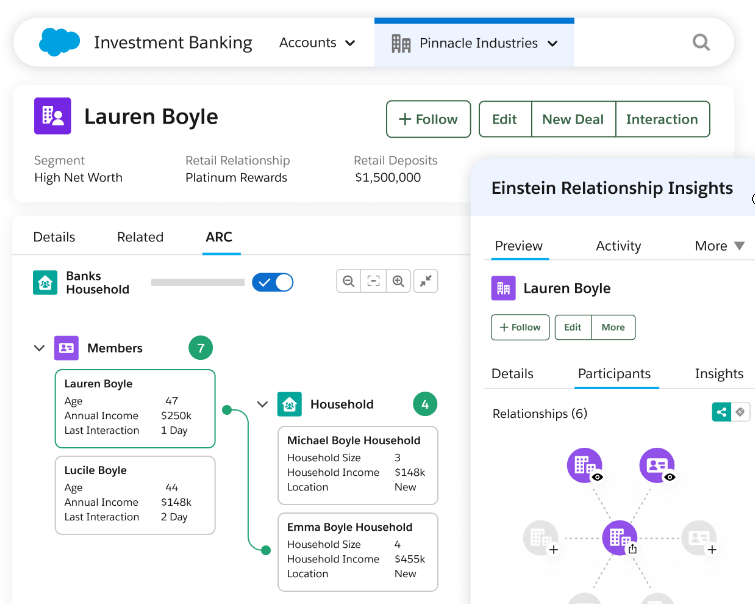
Financial Services Cloud helps financial pros to better understand their clients, personalise interactions, and smooth out processes across different teams. It has tools for managing leads, getting customers on board, financial planning, and regulatory compliance.
With its data-driven smarts and easy integration with other Salesforce products, Financial Services Cloud helps financial organisations build strong customer relationships, drive growth, and ensure compliance.
3. Microsoft
Microsoft Cloud for Financial Services is an all-in-one suite of tools, featuring Microsoft Azure, Microsoft 365, Dynamics 365, Microsoft Teams, and Power Platform, all set up to meet the unique challenges of the financial industry. It helps financial advisors to handle loads of financial data, delivering top-notch experiences, empowering staff, and combating financial crime.
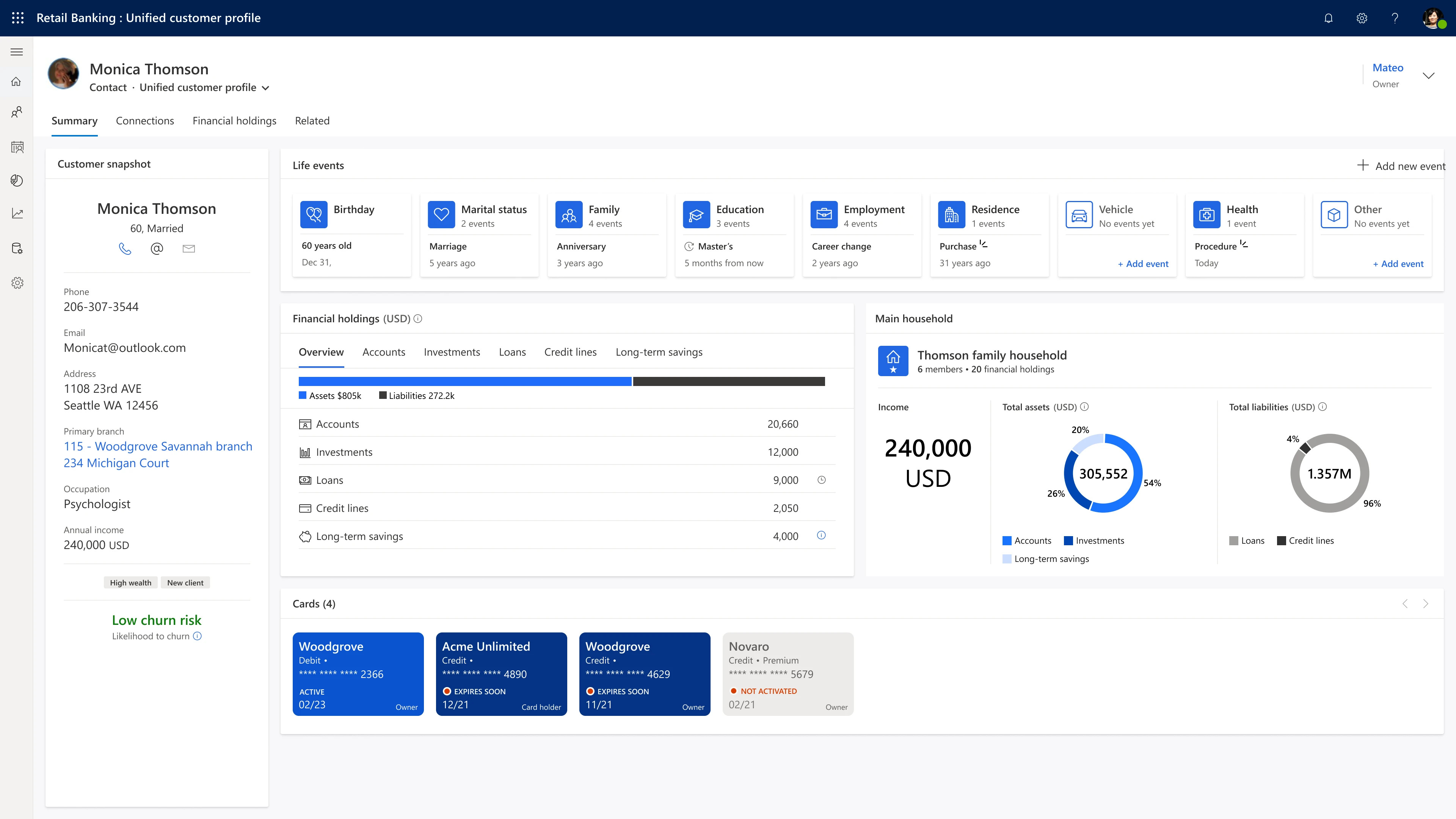
This cloud-based solution is big on security, compliance, and seamless integration. By boosting teamwork, automation, and insights, it sharpens operations, personalises customer interactions, improves overall customer experiences, and offers valuable data insights.
This industry-specific cloud taps into Microsoft's existing and new capabilities, driving responsible growth with a strong network of partners.
4. Oracle
Oracle CX for Financial Services helps financial advisors modernise their operations and shift to a digital client experience. It gives a 360-degree view of customer data and interactions, allowing financial organisations to build personal connections with each customer and offer tailored financial solutions.
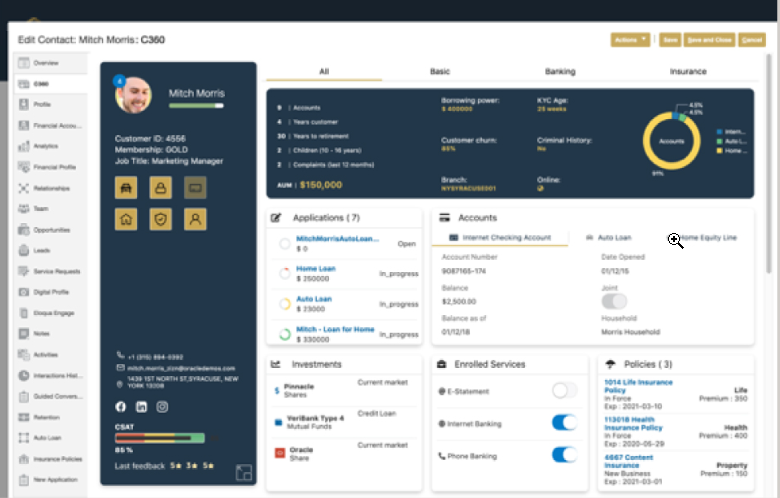
Automation makes it easy to find opportunities, nurture leads, and refer customers for cross-selling products across social, mobile, and web. The Needs Analysis feature helps you suggest products that suit each customer, making client onboarding and account opening straightforward and improving overall customer satisfaction.
5. HubSpot
HubSpot CRM is a flexible tool for managing customer relationships, covering marketing, sales, services, operations, and content management. While it isn’t specifically tailored for financial services, it can be tweaked to help with decision-making based on data.
This platform lets financial pros effectively organise, track, and nurture client interactions, boosting customer relationships. HubSpot CRM also comes with analytics and reporting features for help with data-driven decision-making.
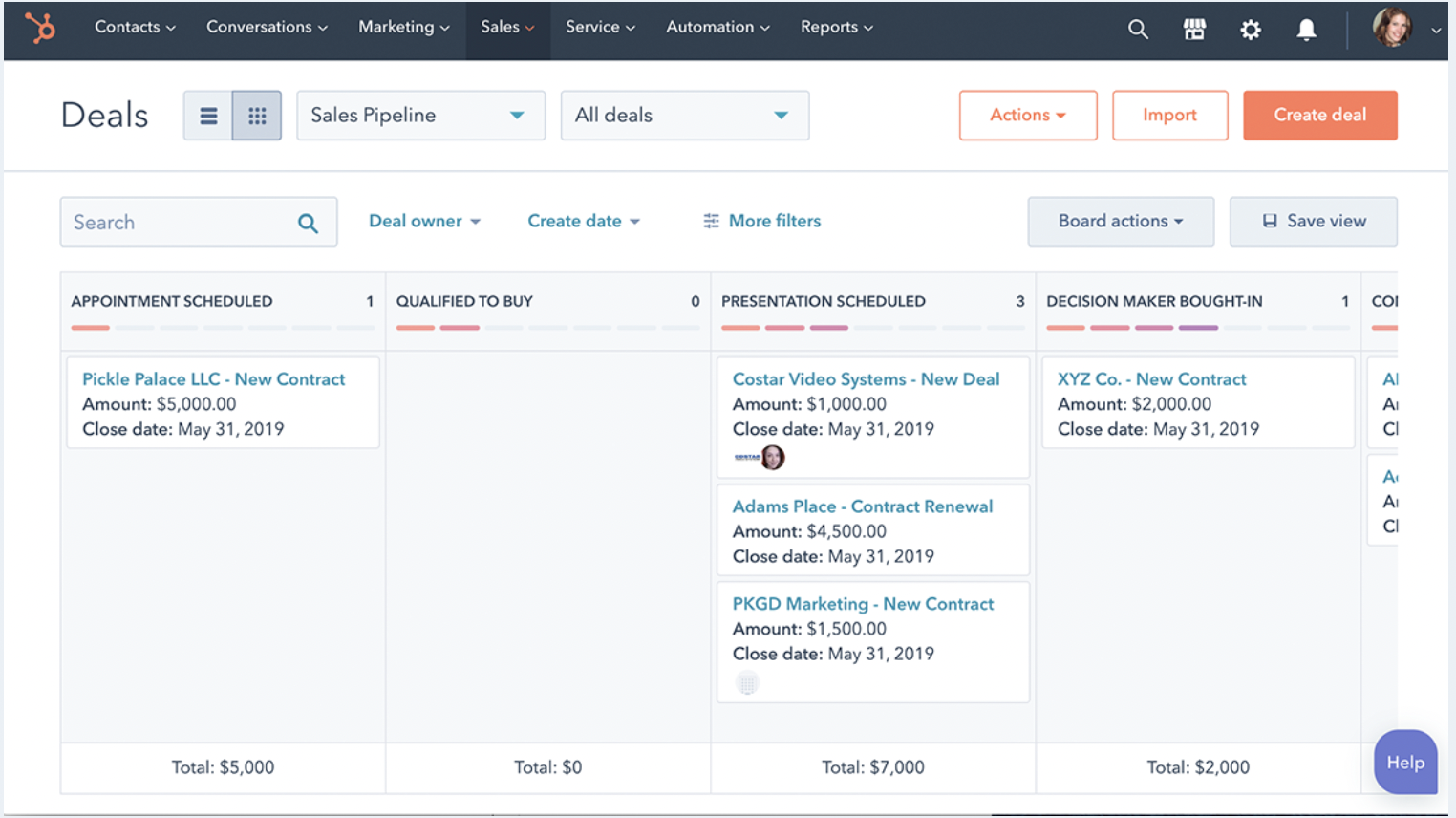
It makes compliance management easier and integrates smoothly with other HubSpot tools, making it simple to share data and communicate across the organisation. With its user-friendly interface and ability to scale, HubSpot CRM helps financial organisations to offer personalised experiences and drive growth.
6. BUSINESSNEXT
BUSINESSNEXT is a CRM suite made especially for financial advisors. It’s all about shaking up banking bankingwith platforms like CRMNEXT, DATANEXT, CUSTOMERNEXT, and more than 12 other ready-to-go products.
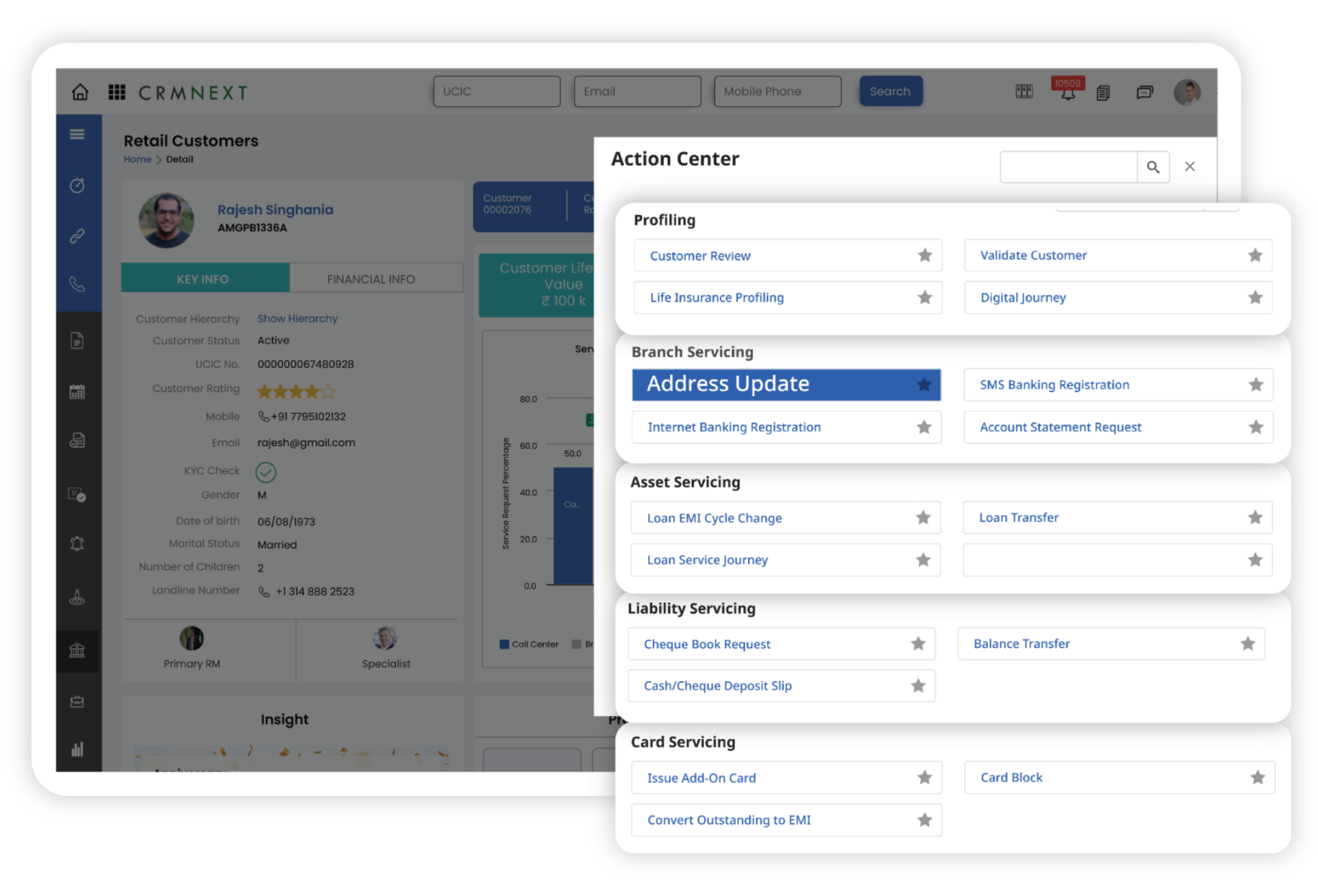
BUSINESSNEXT gives businesses the tools to head towards autonomous banking, offering a seamless experience for users, customers, and partners. It uses full-stack big data and AI capabilities, so businesses can tweak, rearrange, and reorient their tech components using the flexible “Fybre” architecture. This means super scalability, cloud-native setups, and observability, paving a way for a complete transformation towards autonomous banking.
FAQ
What is finance CRM?
Finance CRM, or Financial Customer Relationship Management, is software designed specifically for the financial services industry. It helps financial advisors manage customer interactions, streamline operations, stay compliant, and offer personalised products and services.
How does Financial CRM software improve customer experiences?
CRM for finance gives a 360-degree view of client information, which helps in providing personalised services, responses in no time, and tailored financial solutions. This boosts customer satisfaction and trust.
Which departments within financial institutions can benefit from finance CRM?
Different departments like marketing, sales, customer service, loan origination, compliance, HR, IT, and finance, can all use finance and CRM tools to streamline processes and improve customer experience.
What are the key features of financial CRM software?
Key features include managing data in one place, automating marketing and sales, improving customer service support, automating workflows, using AI and machine learning, communicating across different channels, managing documents, and analysing data.
How do you choose the best CRM for your bank?
When choosing the best finance CRM, consider factors like customisation, user adoption, ease of use, security, scalability, and how open it is to new tools. This way, it’ll meet your business’s needs and help it grow in the long run.





















































